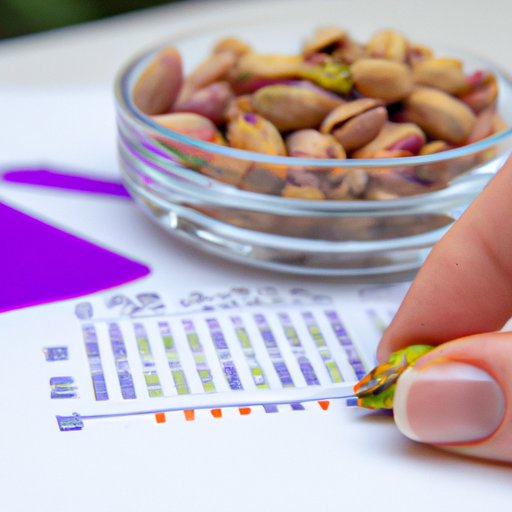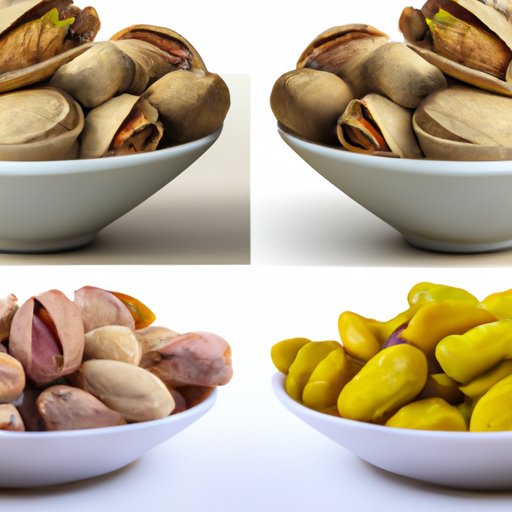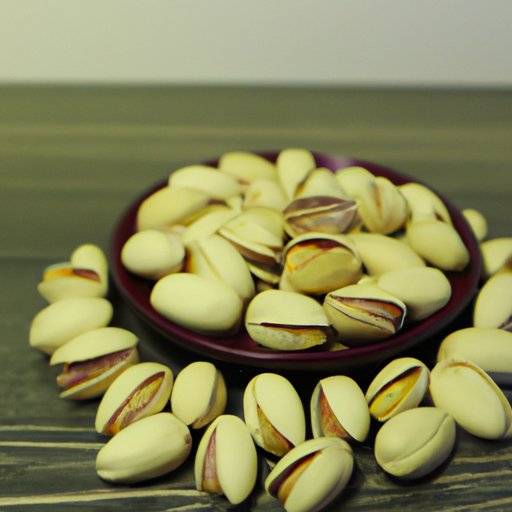Introduction
Pistachios are small, green nuts with a sweet and salty flavor. They’re often eaten as a snack, but they can also be used in a variety of recipes. It’s important to know whether or not pistachios are good for you so that you can make informed decisions about your diet. In this article, we’ll explore the nutritional profile, health benefits, and recipes for pistachios.

Examining the Nutritional Profile of Pistachios
Pistachios are a nutrient-dense food, meaning that they contain a high amount of nutrients compared to their calorie content. One ounce (28 grams) of pistachios contains the following nutrients:
- Calories: 159
- Carbohydrates: 8 grams
- Fiber: 3 grams
- Protein: 6 grams
- Fat: 13 grams
Exploring the Macronutrients in Pistachios
Pistachios are mostly composed of fat, followed by carbohydrates and protein. The fats found in pistachios are mostly unsaturated, which makes them a healthier choice than other sources of fat such as saturated and trans fats.
The carbohydrates in pistachios consist mainly of fiber, which is important for digestion and may help reduce cholesterol levels. The protein content in pistachios is relatively low, making them an imperfect source of protein.
Examining the Micronutrients in Pistachios
In addition to macronutrients, pistachios also contain a variety of micronutrients. These include vitamins B6, E, and K, as well as minerals such as potassium, phosphorus, magnesium, and iron. Pistachios are also a good source of antioxidants, which may help protect against diseases such as cancer.
The Health Benefits of Eating Pistachios
Pistachios have been linked to a variety of health benefits due to their nutritional content. Here are some of the potential benefits of eating pistachios:
Heart Health Benefits
According to a study published in the American Journal of Clinical Nutrition, eating pistachios may help reduce cholesterol levels and decrease the risk of heart disease. This may be due to the unsaturated fats, fiber, and antioxidants found in pistachios.
Benefits for Weight Management
Pistachios are a low-calorie snack that can help you feel full for longer. A study published in the journal Nutrition Research found that participants who ate pistachios experienced greater feelings of fullness than those who ate a snack without pistachios. This may be due to the protein, fiber, and fat content of pistachios.
Improved Digestion
Pistachios are a good source of fiber, which is important for digestion. According to a study published in the Journal of Nutrition, consuming pistachios may help improve digestive function and reduce constipation. This may be due to the high fiber content of pistachios.
Potential Cancer Prevention Benefits
Pistachios contain antioxidants, which may help protect against certain types of cancer. A study published in the Journal of Agricultural and Food Chemistry found that eating pistachios may help reduce the risk of prostate cancer. This may be due to the antioxidants found in pistachios.

Exploring the Role of Pistachios in a Healthy Diet
Pistachios can be a healthy addition to your diet if consumed in moderation. Here are some tips for incorporating pistachios into your diet:
Guidelines for Incorporating Pistachios into Your Diet
- Aim to eat one to two servings (1/4 cup to 1/2 cup) of pistachios per day.
- Eat pistachios as a snack or use them in recipes such as salads, stir fries, or desserts.
- Choose unsalted, raw, or dry roasted pistachios to reduce sodium intake.
Tips for Ensuring Optimal Nutrition from Pistachios
- Eat pistachios with other nutritious foods such as fruits, vegetables, and whole grains.
- Avoid eating too many salted, flavored, or honey-roasted pistachios, as these may be higher in sodium and sugar.
- Be mindful of portion sizes, as eating too many pistachios can lead to weight gain.

A Comparison of Pistachios vs. Other Nuts
Pistachios are not the only type of nut that can be part of a healthy diet. Here’s a comparison of the nutritional profiles and health benefits of different types of nuts:
Comparing the Nutritional Profiles of Different Types of Nuts
All nuts contain a variety of nutrients, but some may have higher amounts of certain nutrients than others. For example, almonds contain more calcium and iron than pistachios, while walnuts contain more omega-3 fatty acids. It’s important to compare the nutritional profiles of different types of nuts to ensure that you’re getting the most out of your diet.
Exploring the Health Benefits of Different Types of Nuts
All types of nuts offer a variety of health benefits. For example, walnuts are high in omega-3 fatty acids, which may help reduce inflammation and lower cholesterol levels. Almonds are rich in vitamin E, which may help protect against oxidative stress. Cashews are a good source of zinc, which may help boost immunity. All types of nuts offer health benefits, so it’s important to choose the ones that best meet your needs.
Pistachio Recipes for Optimal Nutrition
Incorporating pistachios into your diet can be fun and easy. Here are some delicious recipes using pistachios for optimal nutrition:
Easy and Delicious Salads with Pistachios
- Kale Salad with Roasted Sweet Potatoes and Pistachios
- Quinoa Salad with Feta, Pomegranate Seeds, and Pistachios
- Arugula Salad with Apples, Walnuts, and Pistachios
Savory Dishes with Pistachios
- Vegetable Stir Fry with Pistachios
- Couscous with Roasted Vegetables and Pistachios
- Rice Pilaf with Raisins, Pistachios, and Almonds
Sweet Treats with Pistachios
- Chocolate Chip Cookies with Pistachios
- Pistachio Ice Cream
- Pistachio Cake with Lemon Glaze
Conclusion
Pistachios are a tasty and nutritious snack that can be incorporated into a healthy diet. They are a good source of fiber, protein, and unsaturated fats, as well as vitamins and minerals. Eating pistachios may help improve heart health, aid in weight management, improve digestion, and even reduce the risk of certain types of cancer. When incorporating pistachios into your diet, aim to eat one to two servings per day and be mindful of portion sizes. Enjoy pistachios as a snack or incorporate them into recipes such as salads, stir fries, or desserts.
By understanding the nutritional profile and health benefits of pistachios, you can make informed decisions about your diet. With the right balance of nutritious foods, you can enjoy the delicious taste of pistachios while reaping the health benefits.
(Note: Is this article not meeting your expectations? Do you have knowledge or insights to share? Unlock new opportunities and expand your reach by joining our authors team. Click Registration to join us and share your expertise with our readers.)
